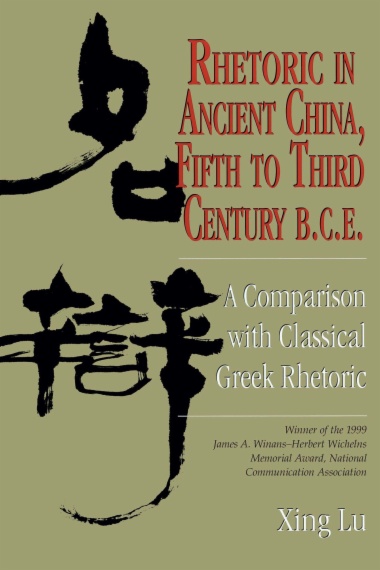Xing Lu examines language, art, persuasion, and argumentation in ancient China and offers a detailed and authentic account of ancient Chinese rhetorical theories and practices within the society's philosophical, political, cultural, and linguistic contexts. She focuses on the works of five schools of thought and ten well-known Chinese thinkers from Confucius to Han Feizi to the the Later Mohists. Lu identifies seven key Chinese terms pertaining to speech, language, persuasion, and argumentation as they appeared in these original texts, selecting ming bian as the linchpin for the Chinese conceptual term of rhetorical studies.
Lu compares Chinese rhetorical perspectives with those of the ancient Greeks, illustrating that the Greeks and the Chinese shared a view of rhetoric as an ethical enterprise and of speech as a rational and psychological activity. The two traditions differed, however, in their rhetorical education, sense of rationality, perceptions of the role of language, approach to the treatment and study of rhetoric, and expression of emotions. Lu also links ancient Chinese rhetorical perspectives with contemporary Chinese interpersonal and political communication behavior and offers suggestions for a multicultural rhetoric that recognizes both culturally specific and transcultural elements of human communication.
- Cover�������������������������������
- Rhetoric in Ancient China Fifth to Third Century B.C.E.�������������������������������������������������������������������������������������������������������������������������������������������������������������������������������������
- Title�������������������������������
- Copyright�������������������������������������������
- Dedication����������������������������������������������
- Contents����������������������������������������
- Editor's Preface����������������������������������������������������������������
- Preface�������������������������������������
- Acknowledgments�������������������������������������������������������������
- A Chronology of Chinese Dynasties from Xia to the Warring States Period�������������������������������������������������������������������������������������������������������������������������������������������������������������������������������������������������������������������������������������
- Chinese Schools of Thought and Major Thinkers�������������������������������������������������������������������������������������������������������������������������������������������������������
- Abbreviations�������������������������������������������������������
- Introduction����������������������������������������������������
- CHAPTER ONE Perceptions and Methodology in the Study of Classical Chinese Rhetoric����������������������������������������������������������������������������������������������������������������������������������������������������������������������������������������������������������������������������������������������������������������������
- CHAPTER TWO Cultural Contexts and Rhetorical Practices of the Pre-Qin Period����������������������������������������������������������������������������������������������������������������������������������������������������������������������������������������������������������������������������������������������������
- CHAPTER THREE Chinese Terminology of Rhetoric�������������������������������������������������������������������������������������������������������������������������������������������������������
- CHAPTER FOUR Rhetorical Features in Literary and Historical Texts�������������������������������������������������������������������������������������������������������������������������������������������������������������������������������������������������������������������
- CHAPTER FIVE Conceptualization of Ming Bian: The School of Ming�������������������������������������������������������������������������������������������������������������������������������������������������������������������������������������������������������������
- CHAPTER SIX Conceptualization of Yan and Ming Bian: The School of Confucianism����������������������������������������������������������������������������������������������������������������������������������������������������������������������������������������������������������������������������������������������������������
- CHAPTER SEVEN Conceptualization of Ming Bian: The School of Mohism����������������������������������������������������������������������������������������������������������������������������������������������������������������������������������������������������������������������
- CHAPTER EIGHT Conceptualization of Yan and Ming Bian: The School of Daoism����������������������������������������������������������������������������������������������������������������������������������������������������������������������������������������������������������������������������������������������
- CHAPTER NINE Conceptualization of Shui and Ming Bian by Han Feizi
- CHAPTER TEN Conclusions and Implications����������������������������������������������������������������������������������������������������������������������������������������
- Notes�������������������������������
- Bibliography����������������������������������������������������
- Index�������������������������������
- About the Author����������������������������������������������������������������

